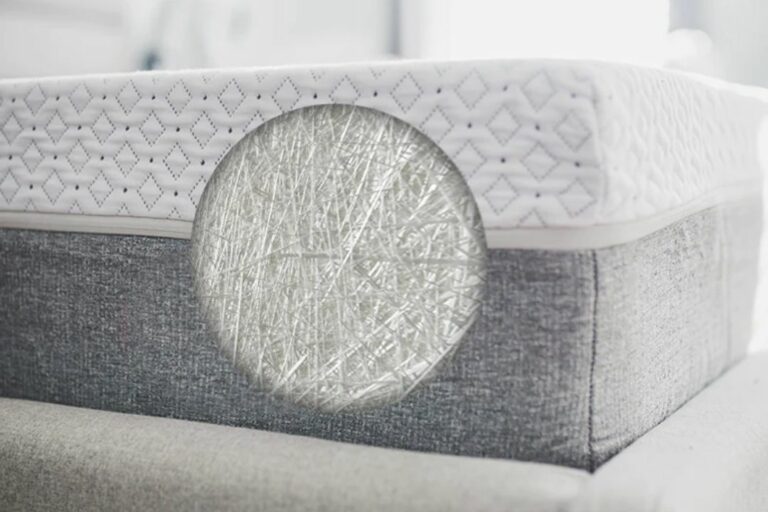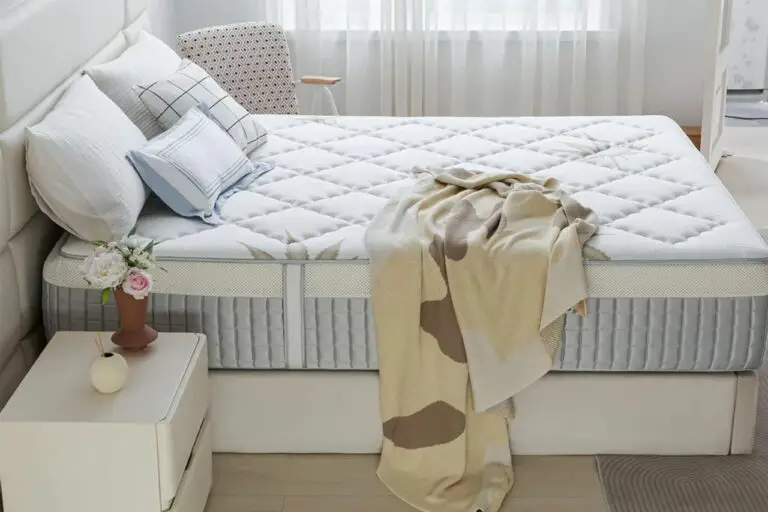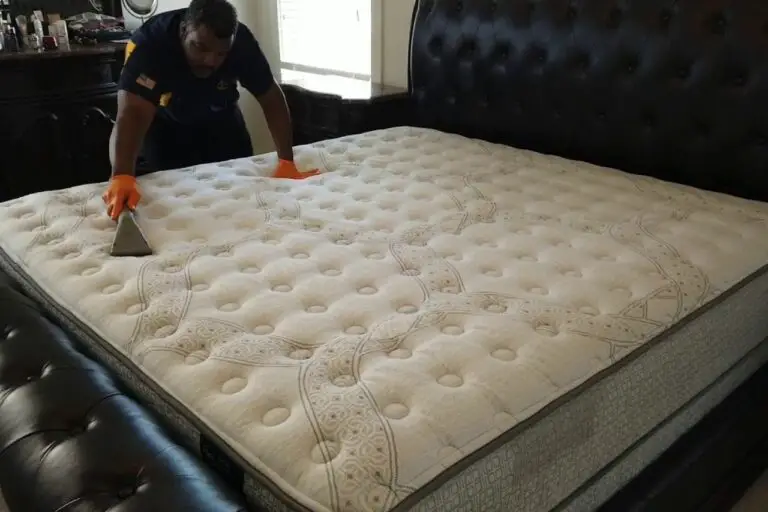Can a New Mattress Cause Back Pain? (The Truth!)

Are you suffering from acute or chronic back pain? Perhaps your discomfort has arisen after a new mattress was placed in your bedroom – and now you’re questioning whether it’s the mattress that is causing the ailment or if there may be something more complex going on.
If so, don’t let your mattress be the culprit! Instead, take action and acquire one that’s crafted from natural materials such as memory foam or latex; both of which provide exceptional comfort while also safeguarding against any health concerns such as pressure points.
Can a New Mattress Cause Back Pain?
Generally speaking Yes, a new mattress can cause back pain. Poorly designed mattresses can cause pressure points that can lead to back pain. Additionally, mattresses that are too soft or too hard can cause back pain. It is important to choose a mattress that is the right firmness for your body type and sleeping position.
A mattress that is too soft can cause your spine to sink into the mattress, while a mattress that is too hard can cause pressure points that can lead to back pain. It is also important to replace your mattress every 8-10 years to ensure that it is providing the proper support for your body.
Definition of back pain:
Back pain is a common complaint, affecting approximately one in every four U.S. adults. It can be caused by a multitude of factors – ranging from an injury or accident to chemical exposures and even lifestyle choices!
Back pain is typically classified into three primary categories: acute (short-term), subacute (intermediate) and chronic.
This indicates the time frame when symptoms typically begin; while it may vary based upon individual circumstances, these indicators can help provide a preliminary assessment of your condition’s severity.
Acute back pain often subsides without leaving any lingering aftereffects.
Subacute back pain recurs intermittently over an extended period of time, but does not demonstrate any distinct episodes beyond that point – this could suggest that underlying causes for the issue are still present within the body.
Finally, chronic back pain persists for more than six months without showing any signs of healing yet- this type of ailment may necessitate medical intervention if left untreated.
Overview of How a new mattress can cause back pain?
If you are suffering from acute back pain, chances are that your mattress is to blame. The newness of this article may seem farfetched, but numerous evidence suggests that such claims are indeed true!
Manufacturers now utilize revolutionary foam formulas and advanced materials in an effort to create the ideal combination for restful slumber.
This allows them to produce mattresses that provide superior comfort and support, while still remaining lightweight – resulting in a more favorable experience when compared to traditional models.
While they might appear luxurious and inviting at first glance, these newfangled options can prove problematic when it comes to accommodating bodies of all sizes.
It’s essential to choose wisely-designated models that suit both one’s personal stature as well as those of their guests; if not chosen properly it could lead to discomfort or even injuries!
Causes of Back Pain from a New Mattress:

1. Inadequate Support:
Are you experiencing back pain from your new mattress? If so, inadequate support may be to blame. Poor mattress support can be caused by too soft or too hard a mattress, an unsupported center third, or too-old coils.
It can also be the result of a mattress that does not match the shape of your body. This can lead to excessive pressure on your hips, shoulders, and lower back, resulting in aches and pains.
To avoid these issues, it is important to consider the type of mattress that best suits your body and sleeping position. For example, if you are a side sleeper, you may want to look for a mattress with softer foam layers and a firmer center core.
For back sleepers, look for a mattress with an even balance of firmness and comfort. Additionally, make sure to replace your mattress every 8 to 10 years to maintain adequate support.
By taking these steps and considering the type of support that works best for you, you can help prevent the aches and pains associated with inadequate mattress support.
2. Uncomfortable Sleeping Positions:
Are you having trouble sleeping because of back pain? It might be because of the way you are sleeping! Uncomfortable sleeping positions can cause back pain, and a new mattress can help. Many people sleep in positions that are not supportive and put extra strain on their back. For example, sleeping on your stomach can increase pressure on your spine, while sleeping in the fetal position can pull your spine out of alignment. This can lead to stiffness, soreness, and aching in the morning. A mattress that is too soft or too hard can also make it difficult to find a comfortable position and cause back pain. Investing in a new mattress with the right firmness and support can help alleviate discomfort and prevent future back pain. When shopping for a new mattress, take the time to test out different models to find one that will provide your body with the best support for a good night’s sleep.
3. Poor Quality Construction:
Poor quality construction can be a major cause of back pain from a new mattress. It is important to be aware of the materials and manufacturing processes used in mattresses, as these can affect the overall comfort and support levels. Low-grade materials may not provide adequate support, leading to discomfort and back pain. Poorly constructed mattresses may also lack the necessary padding to cushion pressure points, making you more prone to aches and pains. Additionally, incorrect stitching and weak seams can cause the mattress to break down prematurely, leading to uneven support and increased back pain. To ensure that you get the best quality mattress for your needs, look for mattresses that feature high-quality materials like memory foam or natural latex for superior comfort and support. You should also seek out mattresses with strong stitching and reinforced seams to prevent early breakdown. By investing in a quality mattress, you can minimize your chances of developing back pain from a new mattress.
4. Symptoms of Back Pain from a New Mattress:
Getting a new mattress is an exciting process, but it can also have its drawbacks. If you experience sudden or unusual back pain after purchasing a new mattress, it could be due to the change in your sleeping surface. Common symptoms of back pain from a new mattress include discomfort, stiffness, and even sharp pains that can be localized in certain areas. It’s important to recognize these symptoms and take action to address them. To start, make sure to give your body time to adjust to the new mattress. Spend at least a week sleeping on the mattress before attempting any more drastic changes. Also, try to sleep in different positions to evenly distribute your body weight across the mattress. If you don’t experience any relief, consider investing in a mattress topper or pad to soften the surface and provide additional support. Finally, be sure to consult with your doctor if your pain persists or worsens over time. With the right strategies, you can make sure you’re getting the best sleep possible on your new mattress.
5. Pain in the Lower Back:
You may be wondering what’s causing the discomfort and how to fix it. It’s possible that the new mattress is too firm or too soft, or that your body just needs time to adjust to the new surface. It’s also possible that your sleep posture or position is incorrect. To help reduce the pain in your lower back, you can try adjusting your sleep position and using a pillow to support your spine. You may also want to consider a mattress topper for additional cushioning and support. The type of topper you choose will depend on your individual needs, but many people find memory foam toppers to be helpful. Additionally, if the mattress is too firm, you may want to look into a mattress pad or protector with individualized comfort settings. Taking time to properly care for yourself and your mattress will help ensure that the pain in your lower back is reduced.
6. Pain in the Upper Back:
If you’re experiencing pain in your upper back after purchasing a new mattress, you may be wondering what’s going on. It’s not uncommon for sleepers to experience upper back pain due to their new sleeping surface. It could be a sign that the mattress isn’t providing adequate support or that it’s too firm for your body type. To help alleviate the discomfort, here are some tips to consider. First, make sure you’re using a mattress that suits your sleeping position. If you’re a side sleeper, you’ll need a softer mattress that can conform to your body. For back and stomach sleepers, look for a firmer mattress that can keep your spine aligned. Secondly, you might need a mattress topper or pillow to provide extra cushioning and support. Thirdly, it’s important to rotate or flip your mattress every few months to ensure even wear and tear. Finally, pay attention to the support in the upper back region of the mattress; if it’s not providing enough support for your body type, it may be time to look for a new mattress. With these tips in mind, you can start sleeping soundly again and enjoy the comfort of your new mattress.
7. Stiffness in the Back:
This is a common occurrence, and it’s important to understand the underlying cause and how to remedy it. The stiffness is caused by the mattress being too firm for your body, as softer mattresses are better for maintaining proper spinal alignment. To fix this problem, start by rotating your mattress regularly, as this can help improve the overall comfort of the mattress by evening out the wear and tear. Additionally, you can add a mattress topper that helps to soften the mattress, but make sure to select one that is made of breathable materials like memory foam or latex. Finally, if the mattress is still too stiff, consider replacing it with a model that is more suitable for your preferred level of comfort. With these tips and tricks, you can reduce stiffness in your back and get a better night’s sleep.
How to Avoid Back Pain from a New Mattress?
Getting a new mattress is an exciting experience, but it can also be a source of back pain if you don’t take the right precautions. To avoid back pain from a new mattress, it’s important to take the time to find the right mattress for your body type and sleeping habits.
- Start by considering the type of mattress that will best suit your needs. Memory foam mattresses are great for providing support and relieving pressure points, while innerspring mattresses are better for those who prefer a firmer surface.
- Once you’ve chosen the type of mattress, it’s important to test it out in the store.
- Lie down on the mattress for at least 10 minutes to get a feel for how it supports your body. If you’re buying a mattress online, make sure to read customer reviews to get an idea of how it will feel.
- Finally, it’s important to use the right bedding and pillows to ensure that your spine is properly aligned while you sleep.
A mattress topper can also help to provide extra cushioning and support. By taking the time to find the right mattress and bedding, you can avoid back pain and get a good night’s sleep.
Choose the Right Mattress:
If you’re suffering from back pain, it’s essential to select a mattress that best accommodates your needs. That could mean opting for a firm or plush model with varying thicknesses and depths – an abundance of choices await!
With everything from pocketed coils, memory foam and more, there is truly no shortage of options for the consumer. However, the industry standard remains innerspring mattresses which are still widely used even today. As such, specialized varieties like comfort and pressure relief models are often sold alongside conventional ones in order to offer consumers greater choice in their selections – offering them optimal levels of support while at the same time ensuring sufficient ease in sleeping experience!
Adjust Your Sleeping Position:

Many individuals tend to fall asleep in the same position every night, but your sleeping posture should be modified for optimal comfort. Experiment with various options and come up with the ideal arrangement for you – ideally one that relieves any tension from your body.
Propping your head up with a cushion or bag can be an effective remedy if you are experiencing pain in your neck. Alternatively, elevating one leg on a pillow could help alleviate any discomfort associated with heavy legs!
Adjust Your Sleeping Habits:
Adjusting your sleeping habits can be an effective remedy if you experience back pains. For example, if you’re among those who frequently adhere to a restrictive sleep schedule that leaves little time for restful slumber during the day then opting for an earlier bedtime or even opting out of going to work in the morning could be beneficial from both perspectives – physically and financially!
On the flip side of things, if you toss and turn for hours upon hours each night before finally succumbing to sleep it may not be a good idea to purchase a new mattress. Although some people report having more restful nights after purchasing a new one- it’s all relative when considering just how much effort is invested into making a decision like this!
Conclusion:
In conclusion, it is important to be aware that a new mattress may cause back pain. This is due to the fact that it takes time for a person’s body to adjust to the new mattress and become accustomed to the different support it provides.
To avoid back pain from a new mattress, it is important to take time to break in the mattress by sleeping on it for a few weeks before deciding if it is the right mattress for you.
Additionally, some tips for preventing back pain from a new mattress include choosing a mattress that provides appropriate support for your body, using a mattress pad to reduce the pressure points, and replacing the mattress every seven to ten years.







